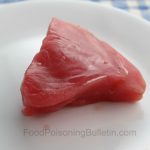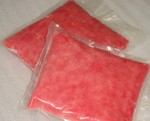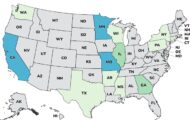The recall of Albertsons Tuna Salad products for Listeria has been expanded to include later best by dates. The tuna salad was made by Reser's Fine Foods, using breadcrumbs from Newly Weds Foods. No illnesses have been reported to the company to date in connection with the consumption of these products. The recalling firm is Reser's Fine Foods. The list of products remains the same: RM Duo Tuna Salad with Crackers, RM Tuna Salad Premium SS, RM Snacker Tray Tuna Salad, RM Sandwich Tuna Salad Croissant SS Cold, RM Tuna Salad Over Bed of Lettuce SS, and Salad Tuna Premium. Also recalled is Tray Croissant Mini Salad 16 Inches, Tray Croissant Mini Salad 18 inches, Tray Salad Sandwich 12 inches, and Tray Salad Sandwich 16 inches. No pictures of the recalled products were provided. The … [Read more...]
Fresh Catch Yellowfin Tuna Recalled For High Histamine Levels
Fresh Catch Yellowfin Tuna is being recalled for high levels of histamines. Because this recall notice was posted on the FDA's Enforcement Reports page, and not the regular recall page, there is no mention about whether or not any illnesses have been reported to the company to date in connection with the consumption of this fish. The recalling firm is Fresh Catch Inc. of Los Angeles, California. Histamines are a compound that can cause scromboid poisoning. Symptoms of this illness include tingling and burning in the mouth, facial swelling, hives, itchy skin, nausea, vomiting, and diarrhea. Some people can experience symptoms similar to asthma, with wheezing, coughing, or difficulty breathing. The recalled product is Fresh Catch Yellowfin Tuna that is packaged as one loin per … [Read more...]
FDA Releases New Total Diet Study Report on Toxic Elements
The FDA has released their new Total Diet Study Report that focuses on the presence of toxic compounds in the foods we eat. The overall takeaway is that the key toxic elements were not detected in most (68%) of the tested foods. The analysis was conducted in foods that were collected from 2018 through 2020. Overall, 3,276 food, beverages, and water products were studied. The key elements studied were lead, arsenic, including inorganic arsenic, the most dangerous form, cadmium, and mercury. Overall, lead was found in 15% of the samples, arsenic in 43%, cadmium in 61%, and mercury in 8%. The categories of food included in the study were alcohol, baked goods, baby food, beverages, candies, condiments, dairy, fruit, grains, meats, ingredients like sugar and flour, compound foods such as … [Read more...]
Seafood Salmonella Outbreak History Goes Back Years
A new Salmonella Thompson outbreak has been linked to fish produced by Northeast Seafood Products. The outbreak has sickened at least 102 people in 14 states. Is seafood commonly contaminated with this pathogen? Let's look at seafood Salmonella outbreaks in the past few years. Salmonella does not occur naturally in fish or shellfish, as it does in poultry. For this food to be contaminated with the pathogen, it must come from an outside source, either in water or production and processing facilities. We don't know what happened in the current outbreak yet. In 2012, a Salmonella Bareilly outbreak associated with tuna imported from India sickened at least 425 people. Fifty-five people were hospitalized. In 2015, a Salmonella Paratyphi outbreak sickened six people in New Mexico. … [Read more...]
FDA Updates Yellowfin Tuna Scombrotoxin Outbreak
The FDA has updated the yellowfin tuna scombrotoxin outbreak that is linked to tuna that has sickened dozens of people in the U.S. In November 2019, FDA placed Truong Phu Xanh Co., LTD of Vietnam on Import Alert, which allows the government to detail the firm's yellowfin tuna without physical examination. Truong Phu Xanh is the supplier of the tuna associated with most of the illnesses. The FDA has also asked the company to initiate a voluntary recall of all of its imported yellowfin (ahi) tuna with production dates from January 2019 to the present, and the firm has not complied. In November 2019, there were 47 people sick with scombrotoxin fish poisoning with illness onset dates from August 8, 2019 to October 15, 2019. As of December 26, 2019, there are 50 people sick in this … [Read more...]
Tuna King Medallions Recall For Elevated Histamine Levels Expanded
Northern Fisheries of Little Compton, Rhode Island is expanding their recall of frozen, wild-caught yellowfin Tuna King Medallions for elevated histamine levels to include products that were sold directly to consumers. Apparently there was an earlier recall of these products that were sold to institutions or restaurants, but we could not locate it on the FDA recall page. Elevated histamine levels in seafood can produce an allergic reaction called scombroid fish poisoning. Symptoms of this reaction can include tingling or burning sensations in the mouth, facial swelling, nausea, rash, hives, itchy skin, vomiting, and diarrhea. These symptoms usually begin a few minutes to a few hours after eating fish that contains too much histamine. Most people recover without medical treatment, but … [Read more...]
Is Truong Phu Xanh Yellowfin Tuna Linked to Scombrotoxin Outbreak?
The FDA has released a notice about their investigation of Scombrotoxin fish poisoning that is linked to yellowfin tuna. As a result of this investigation, the government has placed Truong Phu Xanh Company of Vietnam on Import Alert, so the FDA field staff can detain the product without physical examination. This fish cannot enter the US unless the importer proves it meets U.S. food safety standards. FDA has asked the supplier of yellowfin tuna that is associated with most of the illnesses, Truong Phu Xanh Co., to initiate a voluntary recall of all of its imported yellowfin tuna with production dates from January 2019 to the prevent. The firm has not recalled any of the fish to date. As part of the investigation, the FDA has evaluated the firm's Hazard Analysis and Critical … [Read more...]
Four Sick with Scombroid After Eating Mical Seafood Tuna Products
Four people are sick since 10/01/2019 with scombroid poisoning after eating Mical Seafood tuna. The company is voluntarily recalling frozen, wild-caught yellowfin tuna poke cubes, tuna loins, tuna ground meat, and 6 ounce tuna steaks because they may have elevated histamine levels. This is the third time in about the last month that yellowfin tuna products have been associated with scombroid poisoning. The illnesses were most likely isolated incidents according to Mical Seafood, but the company issue the recall out of a sense of caution. Histamine or scombroid fish poisoning causes tinging and burning sensations in the mouth, facial swelling, rash, hives, itchy skin, nausea, vomiting, and/or diarrhea. Symptoms usually resolve within a few hours without any medical care, but some … [Read more...]
Wild-Caught Yellowfin Tuna Loins Recalled; Scombroid Illnesses Reported
Alfa International Inc. of Medley, Florida, is recalling refrigerated, wild-caught yellowfin tuna loins because of potentially elevated levels of histamine. This amino acid can produce an allergic reaction called scombroid fish poisoning. Five people have been sickened. The company thinks these illnesses were "isolated incidents," but has issued the recall as a precaution. The tuna loins were sold at Baker’s, Dillon’s, Gerbes, JayC Food, Kroger, and Payless stores in these states: Alabama, Arkansas, Georgia, Illinois, Indiana, Kansas, Kentucky, Michigan, Missouri, Mississippi, Nebraska, Ohio, South Carolina, Tennessee, Virginia, and West Virginia. The recalled tuna loins were labeled as either Yellowfin Tuna Steaks or Seasoned Yellowfin Tuna Steaks. They were sold from either the … [Read more...]
Salmonella Outbreak, Food Fraud Make Tough Times For Tuna
Sorry Charlie, the last 12 months have been kind of rough for tuna. One year ago, the Centers for Disease Control and Prevention (CDC) announced a multi-state Salmonella outbreak linked to frozen, raw yellowfin tuna product that sickened 425 people in 28 states before the CDC declared its end in July. A few months later, a study on food fraud revealed that tuna is one of the most commonly mislabeled fish, landing on consumers' plates only 40 percent of the time they thought they were buying it. Salmonella is the second leading cause of foodborne illness in the U.S., and the leading cause of hospitalizations and deaths that are food-related, according to the U.S. Food and Drug Administration (FDA). More than 370 Americans die from Salmonella poisoning every year. The tuna … [Read more...]











